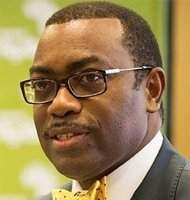AfDB President Backs Nigeria’s EV Industry, Lauds Diaspora-Led Innovation
Adesina praised Faleye’s leap of faith, calling it a shining example of diaspora-driven development and the transformative power of skills repatriation.

- Country:
- Nigeria
The President of the African Development Bank Group (AfDB), Dr. Akinwumi Adesina, has reaffirmed the Bank’s strong commitment to advancing Africa’s industrial transformation, clean energy transition, and entrepreneurial innovation. Speaking during a high-profile visit to Saglev Electromobility Nigeria Limited, an electric vehicle (EV) assembly and distribution company in Ikorodu, Lagos, Adesina spotlighted the EV sector as a strategic frontier for Africa’s industrial future.
“Our role as a bank, and my role as President, is to be a champion of African entrepreneurs,” Adesina said on 31 July 2025, addressing workers and engineers at the Saglev facility.
Saglev: A Diaspora-Driven Vision for Africa’s Mobility
Saglev, which assembles EVs from semi-knocked-down components under a technical partnership with a Chinese automobile group, is spearheading efforts to localize EV production in Nigeria. With an annual capacity of 2,500 vehicles on a single shift, scalable to 10,000 units with multiple shifts, the company aims to supply Nigeria and other emerging markets with sustainable transportation solutions.
Saglev’s founder and CEO, Dr. Sam Faleye, is a Nigerian-American medical doctor and specialist in clinical informatics who returned home to pursue an industrial dream. Reflecting on his journey, Faleye said,
“If I did this project anywhere else in the world, it would not satisfy me as much as this satisfies me.”
Adesina praised Faleye’s leap of faith, calling it a shining example of diaspora-driven development and the transformative power of skills repatriation.
Electric Vehicles and Africa’s Energy Future
During his tour of the facility, Adesina emphasized the strategic intersection between electric mobility and Africa’s renewable energy potential, highlighting AfDB’s infrastructure investments and leadership in clean energy financing.
“Electric vehicles run on electricity. That’s why the African Development Bank has, in the last 10 years, connected over 28 million people to electricity, investing heavily in energy infrastructure,” he said.
Africa, he noted, holds vast untapped renewable energy potential:
-
Solar radiation: 11 terawatts
-
Hydropower: 350 gigawatts
-
Wind energy: 150 gigawatts
-
Geothermal: 15 gigawatts
With the global EV market currently valued at $7 trillion, projected to grow to $59 trillion by 2050, Adesina sees Africa’s participation as non-negotiable.
Tackling Infrastructure and Financing Bottlenecks
Despite the optimism, Adesina acknowledged the challenges facing Africa’s auto and manufacturing industries. Key issues include:
-
High cost of capital, often 3 to 5 times higher than global averages
-
Unreliable and expensive electricity supply
-
Inadequate local production of EV components
-
Lack of widespread battery and charging infrastructure
To address financing constraints, Adesina outlined several tools offered by AfDB to de-risk lending and support industrial entrepreneurs. These include:
-
Lines of credit to Nigerian commercial banks
-
Facilities to lower borrowing costs for SMEs and green ventures
-
Blended finance tools to encourage private sector participation
“The African Development Bank can help in many ways to de-risk lending to companies like this,” Adesina noted, signaling potential for future partnerships.
Human Capital, Gender Inclusion, and Technical Excellence
Dr. Adesina also commended Saglev’s young engineers and technicians, noting the high caliber of technical talent available in Nigeria. He was particularly impressed by the company’s emphasis on gender inclusion in a traditionally male-dominated industry.
“What I saw here was excellence—from the engineering designs, the production lines, to the quality control systems. The youth of Nigeria can compete globally,” he said.
The Role of the African Diaspora
In a heartfelt tribute, Adesina lauded Dr. Faleye’s decision to return to Nigeria, investing not only capital, but also decades of knowledge and experience from the United States. He framed the diaspora’s contribution as pivotal, beyond the $91 billion in annual remittances sent to Africa.
“The big power of the diaspora is not just money—it’s the knowledge, the skills, and the commitment to the continent of your birth,” Adesina emphasized.
He urged governments and development institutions to create enabling environments that make Africa a viable destination for diaspora investment, especially in high-tech sectors like electromobility.
Paving the Way for Africa’s EV Revolution
Dr. Adesina’s visit, accompanied by a senior AfDB delegation including Vice President Solomon Quaynor and Nigeria Country Director Dr. Abdul Kamara, marks a significant endorsement of Nigeria’s emerging EV ecosystem. It also signals the AfDB’s readiness to support homegrown industrial ventures that align with its core priorities: private sector development, infrastructure financing, and green transition.
“Saglev is more than an automobile company,” said Adesina. “It’s a symbol of what Africa can do when vision meets opportunity.”
As Saglev looks to expand production and deepen its footprint across Africa, the visit may serve as a catalyst for broader investments into Nigeria’s automotive sector and the continent’s clean transport revolution.
ALSO READ
AfDB Backs Zambia’s Private Sector with Financing Tools, Strategic Partnerships
PM Modi announces Pradhan Mantri Viksit Bharat Rozgar Yojana; those getting first job in private sector will get Rs 15,000 from govt.
India's Private Sector to Propel Nation's First Earth Observation Satellite System
Four New Appointments to Employment Relations Authority Signal Stronger Private Sector Balance
Call for Gender Inclusion in RSS Leadership Sparks Dialogue










